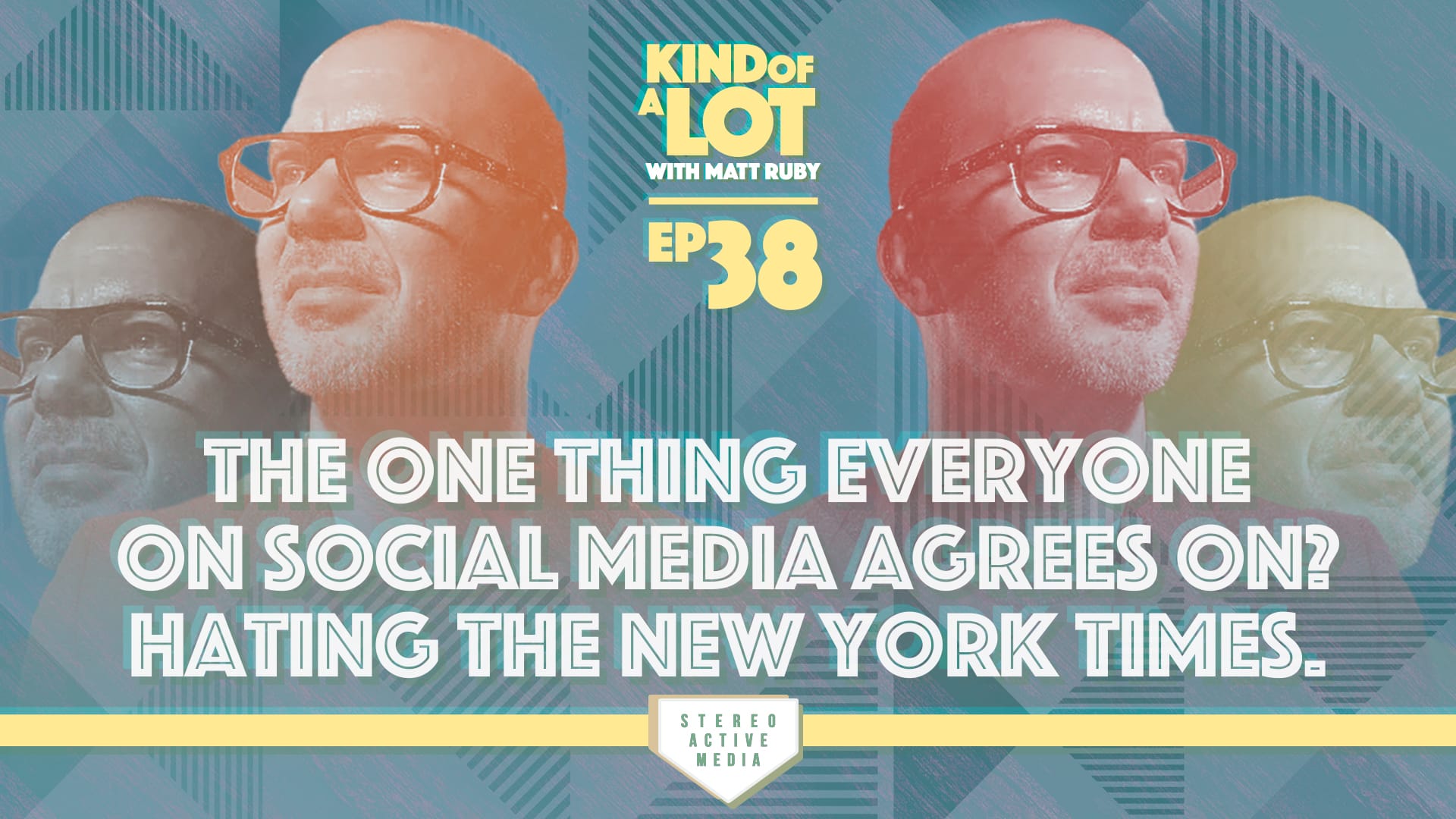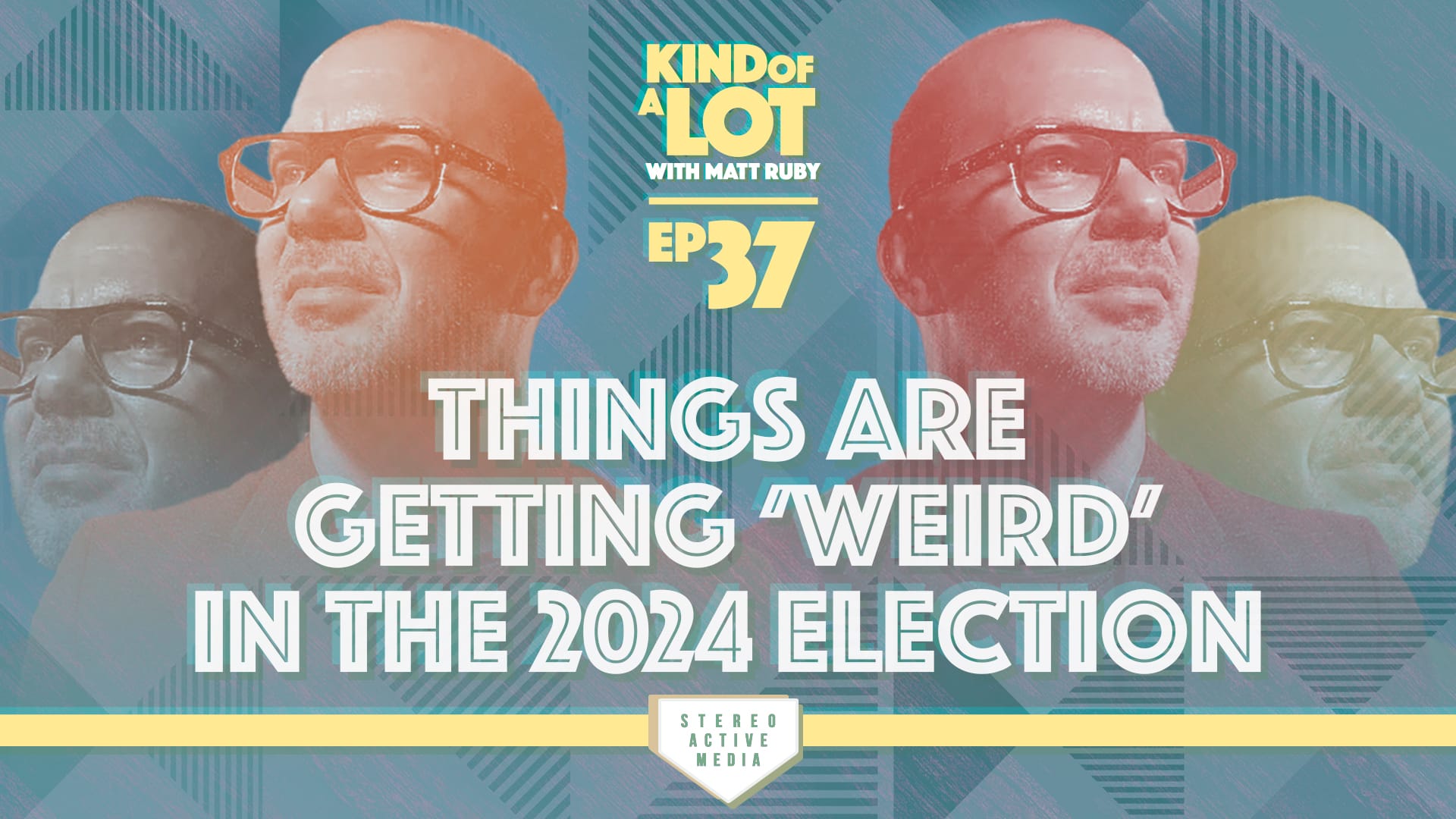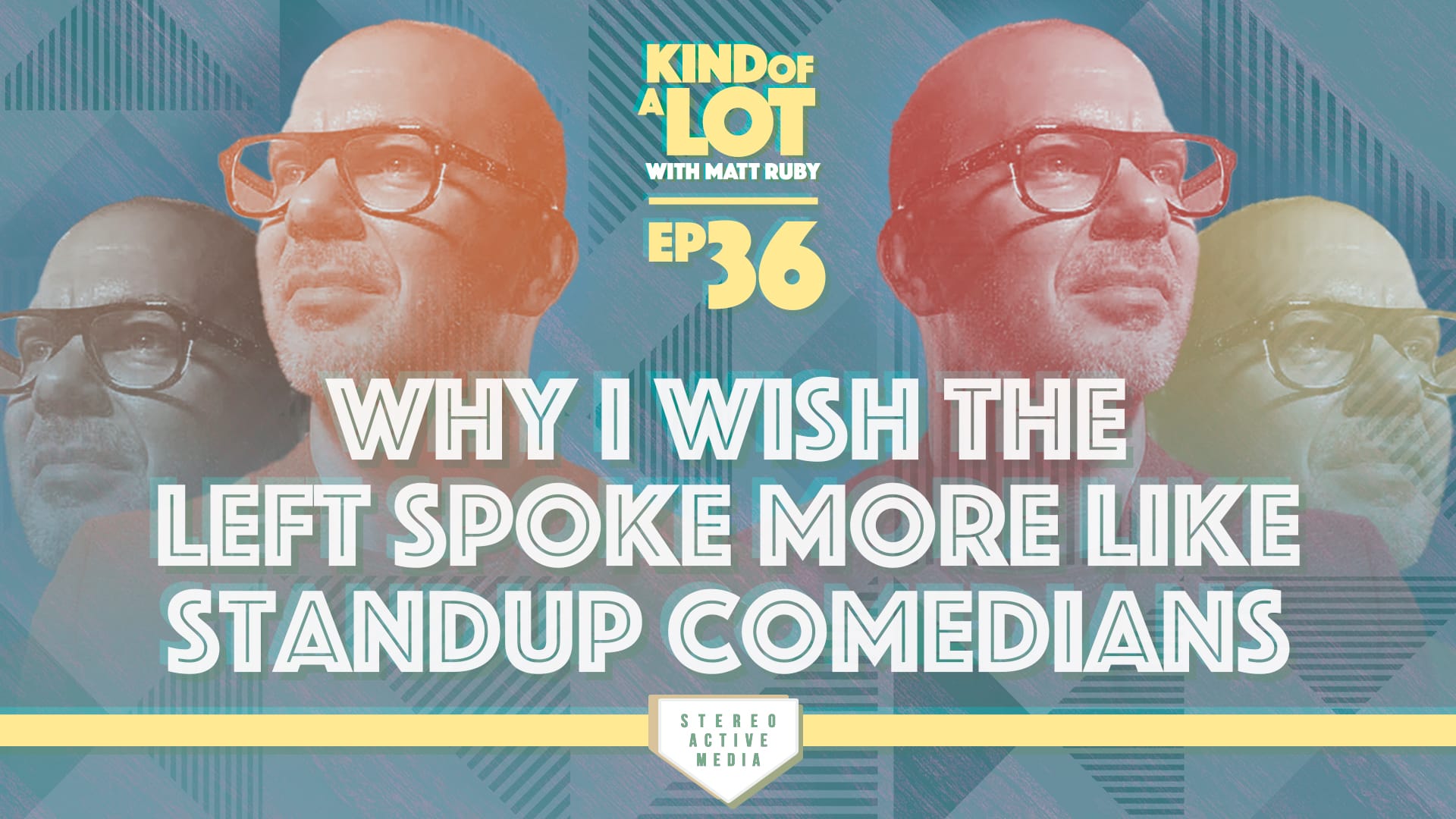Kind of a Lot with Matt Ruby is a video podcast, so subscribe on YouTube and/or watch below!
Of course, you can still listen to the show on Goodpods, Apple Podcasts, Spotify, and anywhere else you listen to podcasts.
Matt Ruby dives into the ever-controversial world of media bias, particularly focusing on the New York Times and its critics from both the left and the right. This widespread disdain raises a crucial question: is the Times doing its job effectively if it is equally reviled by both sides?
Matt tackles the notion that the New York Times, despite its critics, when both sides of the political spectrum find common ground in their disdain, it could signal that the publication is operating in a realm that prioritizes journalism over partisan narratives. This leads to a broader commentary on what constitutes real journalism today—an essential endeavor that goes beyond opinions and relies on reporting that uncovers truths, investigates corruption, conducts tough interviews, and holds power accountable, all important traditional journalism practices that involve rigorous fact-checking and the ethical considerations of protecting sources, especially in an era where misinformation runs rampant.
He addresses the shortcomings and challenges faced by the mainstream media, including the decline of local reporting due to technological shifts, resulting in a significant disconnect between journalists and the communities they serve and leading to increased suspicion and a tendency to label media representatives as "elites" rather than as essential watchdogs. He further argues that without accessible local news, the public's perception of journalism can shift dangerously towards antipathy and distrust. He also delves into the existing climate in journalism where the distinction between opinion and factual reporting is becoming increasingly blurred. The inundation of opinions has led to a dilution of trust in the media, as audiences find it challenging to differentiate between thorough reporting and personal takes. We also explore the consequences of the conventional media's missteps, citing high-profile examples like the WMDs in Iraq and the Rolling Stone UVA assault story to illustrate the fallout and accountability mechanisms that come with traditional journalism.
In reflecting on the state of the New York Times, Matt raises concerns about the sustainability of real journalism in a landscape where many reputable outlets are closed, closing, or in decline. He makes a case for the necessity of supporting institutions like the Times while also remaining aware of their shortcomings, ultimately advocating for a journalistic landscape where the pursuit of truth takes precedence over partisan alignment and urging audiences to consider the role of fair-minded journalism in preserving democratic discourse.
Credits:
- Written and presented by Matt Ruby
- Produced and edited by Jeremiah Lee McVay
Transcript
The following text is autogenerated and may not be 100% accurate.
[0:00] The one thing everyone on social media agrees on? We hate the New York Times. An essay by Matt Ruby.
[0:15] The one thing everyone on social media seems to agree on nowadays? Hating the New York Times. Why? It's biased. See, the Times has long been accused of having a liberal bias and being relentlessly anti-Trump. But now, according to progressives, the Times is directly amplifying propaganda from right-wing extremists and is easily gamed by bad actors on the right. And then there's what's happening in Gaza. Palestinian supporters occupied the lobby of the Times, claiming its coverage was slanted towards Israel. Meanwhile, Israel supporters claim the Times blindly swallows Hamas propaganda. For example, the Times story that had a headline claiming Israel was behind a Gaza hospital blast. Then there's also the usual suspects, you know, trans stuff, backstories, and whatever else people get all tribal about these days.
[1:03] The crazy part is how everyone agrees the New York Times is biased, yet they can't agree on which direction it leans. Seems like half the people think it's to the left and the other half think it's to the right.
[1:12] But wait a minute, that leaves me thinking the paper's probably doing a pretty good job. If both teams hate the refs equally, they're usually calling a fair game. And the question I have for all these Times-bashers, which publication out there is doing it better? I'm talking about real journalism, and I feel like there's a fundamental misunderstanding about how legitimate journalism actually works. I'm talking about the kind of journalism that uncovers hidden truths and holds the powerful to account. It's the sort of thing that involves reporting, not just spouting opinions. I'm talking about working a beat, making phone calls, knocking on doors, investigating corruption, conducting challenging interviews, attending hearings, and so much more. The kind of stuff they do in Spotlight, She Said, and All the President's Men. Because that's how those in power get checked. Also, there's an institution involved with a reputation to uphold. And one that's also liable for publishing lies. There's an editor guiding the story and making sure the reporter is getting it right. There's a fact checker confirming that, well, facts are checked. Multiple sources must corroborate a story. And sources are kept anonymous rarely and only in order to protect them. because it can be harmful to speak up when you're a whistleblower, sexual assault victim, or someone else who fears the repercussions of speaking up. And if a source is anonymous, others at the publication still have to verify what they said and why they should be allowed to remain hidden. And all that comes with an in-house legal team that's able to withstand incoming lawsuit fire.
[2:36] You know what's not journalism? Anything that begins with, people are saying, or it feels to me like, and if you think this is all obvious, well, you haven't met America. Just look at the result. Right now, journalists are in the crosshairs of supposed truth seekers. And I just think that's ridiculous. If you're someone who hates the elites, there's no one you should like more than journalists. They do the legwork that I've got a hunch people refuse to do. Some people point to the BBC or the Guardian as better publications, but come on, they're not doing real journalism here in America. Maybe you agree with their opinion pieces or political slant, but we've got to stop elevating I agree with their takes to the same level as they are doing effective gumshoe reporting. Samir Husni, a longtime magazine analyst, wrote, the thing now is to make everybody happy, but that was never the role of journalism, making people happy. I agree. If the Times did everything its haters desire, the only people left reading it would be folks who are 100% in lockstep agreement. And you know, we already have that everywhere else on the internet. Say what you want about the times, but it's one of the few things consumed across tribes instead of just serving as clickbait catnip for partisans. If that angers you so much, ask yourself, do you really want fair-minded journalism or do you just want your ego stroked and your opinions confirmed? If no one's doing it better, I guess that means it's the best option we've got. Perfect? Of course not. But until there's a better option.
[4:04] Now, all that said, the journalism establishment and the Times needs to look in the mirror, too. People rightfully get the ick from the mainstream media for plenty of good reasons. Here are a few. The death of local reporting. Technology screwed up everything. Craigslist cannibalized classifies, leading to the downfall of newspapers. And as newspapers died, so did local reporting. Now, people in much of the country don't even know a single journalist. And that makes it much easier to label media folks as the other and see them as a tool of the elites rather than watchdogs who keep them in check. It also means people never get to see close-to-home reporting wins. If there was a strong local paper around to dig into, say, George Santos, he never would have been elected.
[4:46] It all seems like one big club, and, well, you ain't in it. Reporters in the mainstream media frequently come out of the same elite private schools and colleges as the people they cover, so it all just seems really chummy. And all those black-tie dinners where reporters and politicians hobnob together.
[5:02] Those ain't helping either. No one trusts TV news. Real journalism happens almost exclusively at newspapers. TV news, it's worse than it's ever been. Just a bunch of talking heads preaching to their partisan choir. Also, I've got a pet peeve. How come there's never a TV reporter with a Southern accent? I mean, diversity is essential, right? So how about including some of the geographic kind? We all get why, say, Asian people want to be represented in Hollywood movies. Well, guess what? Southern people might also like to hear a drawl on a newscast once in a while. If you want people to trust you, it helps to at least occasionally look and sound like they do. Objectivity is a good thing. Once you present as outwardly biased, it's much easier to dismiss your output. Yet more and more news outlets have given up on objectivity, with some journalists even arguing it's an archaic way to approach their profession.
[5:51] But I'd say there's power in trying to tell both sides. It's good to seem objective. Even if it's a mere performance, it's a worthwhile goal. When you squash objectivity, you birth the appearance of impropriety. So I guess I'd say, you know, at least pretend. Everything looks the same. Online news and opinion pieces look almost exactly the same. And when people can't clearly differentiate rigorous journalism from some random dude spouting a take, the line between facts and opinions gets hazy. And that's when people start to lose faith in whatever they're consuming. We're buried under an avalanche of opinions. Opinions are like a-holes. I'm having a tough time monetizing mine on OnlyFans. But seriously, we used to get a newspaper delivered to us with multiple sections and what felt like hundreds of pages of news. And only two pages in that whole batch were opinion and editorial pieces. There's too little nuance. Publications too often do the lump together. They need a trend piece, so they pile a bunch of disparate people or stories together as if they're the same thing, but, I don't know, it gets a bit iffy. For example, see those hashtag MeToo photo montages where Harvey Weinstein, Louis C.K., and Al Franken were treated as equally abhorrent. That flavor of reduction makes people suspicious, since they know that there's a matter of degree that's getting ignored. Big mistakes were made, but at least they were addressed.
[7:14] All right, let's come clean. WMD's in Iraq. Hillary will win easily. The lab leak theory is racist. There are plenty examples of the media getting stuff wrong at first. Add in Hunter's laptop to the mix. But sometimes the real test isn't in getting it right out of the gate. You know, first draft of history and all that. It's how you respond and clean up the mess and get the facts straight eventually. And legitimate, established news outlets tend to be pretty good at correcting fabricated stories and removing those who've gone rogue. Just look at Jason Blair, Brian Williams, or that Rolling Stone UVA assault story.
[7:48] If people who work at a newspaper publish lies, they can lose their reputation and even their career. If people who work at a newspaper publish lies, they can lose their reputation and maybe even their career. That's way more accountability than we see from the hecklers who make bank criticizing them. The media should lean into a we get it right eventually narrative. Let's go back to the New York Times. In reality, the bigger problem here is nearly every other newspaper that did real journalism has gone or is going out of business. That's too much pressure for one publication to bear. One outlet can't be everything to everybody. Instead of tearing down the times, we should be figuring out how to sustain more publications like it. In an age where everyone thinks they're the moral superheroes and are therefore justified in silencing those who disagree, I'll take the publication that's trying to stake some sort of middle ground, even if that irks orthodox folks on the edges. Because if we all go into our isolated bubbles of confirmation bias permanently, it'll be an even bigger threat to democracy than, well, you know.
[8:47] Besides, I'm sick of our society being ruled by the base, on whichever side. The base is made up of extremists and wackos. I desire objectivity, or at least faux objectivity, targeted at reasonable centrists. Give me some of that old-fashioned Jon Stewart both-sizes-im. At this point, I'll take anything that's not the inmates running the publish button. The more someone says screw the base, the more I'm listening. Because I don't need a newspaper that's fighting for me, I need one that's fighting for the truth. And by the way, the New York Times cooking app, it kicks ass. And it has the most hilarious comments section on the internet. You should check it out. So that's where I'm at with the New York Times. Subscription renewed.
[9:31] And now it's time for some quickies. In a red state, you can open carry your weapons. In a blue state, you can open carry your sexual preferences. We've never seen this much ignorance presented this confidently before. And I know, because I'm a moron who's positive he's right.
[10:02] I discovered this amazing kind of Airbnb. You can cancel the day before, no problem. Getting in is simple. It's located in the heart of downtown. It's cleaned every day, and no one leaves a review on you afterwards. It's called a hotel.
For more information on this podcast, including where it's available, please visit the show's homepage. And visit Matt Ruby's website for tour dates and other info.


![We're Never Bored Anymore // Kind of a Lot with Matt Ruby [MICROSODE]](https://www.stereoactivemedia.com/content/images/2025/12/KOALmicro-neverbored-v3-feat.jpg)




